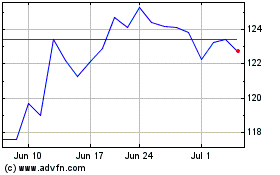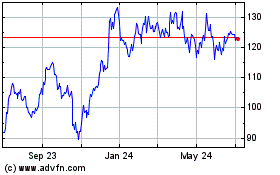White House Adviser Seeks to Reassure Canada of Trade Ties
January 23 2017 - 8:27PM
Dow Jones News
By Paul Vieira
As the Trump administration signals shifts in trade policy, the
chair of a White House economic advisory committee told a Canadian
cabinet session on Monday that Canada isn't the target of a policy
overhaul but rather a model for how to trade with the U.S.
Stephen Schwarzman, the chief executive officer of
private-equity firm Blackstone Group LP and chairman of President
Donald Trump's Strategic and Policy Forum traveled to Calgary,
Alberta, to meet with Canadian Prime Minister Justin Trudeau. Mr.
Trudeau is holding a cabinet meeting there, and the potential
ramifications of the incoming Trump administration is dominating
discussion.
On Sunday Mr. Trump pledged to follow through on his promise to
overhaul the North American Free Trade Agreement and to initiate
talks with Mr. Trudeau and President Enrique Peña Nieto of Mexico.
Mr. Schwarzman told reporters that Mr. Trudeau and Canadian
officials shouldn't be "enormously worried" about the new
administration's plans.
"Canada's held in very high regard. We have balanced trade
between the U.S. and Canada. That's not the kind of situation where
you should be worried," Mr. Schwarzman said.
Mr. Schwarzman added that the ties between the U.S. and Canada
are "a model for the way trade relations should be. So I think
Canada is very well positioned in discussions with the United
States."
The U.S.'s trade deficit with Canada is much smaller than that
with Mexico, which appears to be a greater target of the new
administration's concern about North American trade. In the first
11 months of 2016, the U.S. had a $9 billion trade deficit with
Canada, compared with a $59 billion trade deficit with Mexico.
During the same period, the U.S. trade deficit with China was $319
billion.
The cabinet meeting in Calgary comes at a time of uncertainty
for the Canadian economy, as business leaders, investors and
government fret over the ramifications of Mr. Trump's vow to put
"America First." Canada's small, open economy has evolved over
decades to rely heavily on sales of its manufactured goods,
commodities and services to the U.S. to drive growth.
The Bank of Canada warned last week that any material change in
U.S. trade policy could bring a potential negative shock. "While
the precise trade policy measures to be taken by the incoming U.S.
administration remain to be determined, the protectionist tilt is
already evident," the central bank said.
Two-way trade between the U.S. and Canada is among the largest
trading relationships in the world, totaling $474.4 billion during
the first three quarters of 2016, according to data from the U.S.
Bureau of Economic Analysis.
Mr. Trudeau shuffled his cabinet this month in preparation for
the incoming Trump administration, appointing former Trade Minister
Chrystia Freeland as foreign minister. Meanwhile, in meeting with
Trump advisers and Republican lawmakers, Canadian officials have
tried to underscore the importance of the U.S.-Canada trade
relationship, emphasizing that 35 states -- including rust-belt
states, like Michigan, Ohio, Indiana and Pennsylvania, that voted
for Mr. Trump -- count Canada as its top export market.
So far, Canadian businesses have taken a cautious, wait-and-see
approach toward the new administration, reserving judgment until
they begin to see new policies. Several important industries, led
by motor vehicles and parts, have integrated supply chains across
North America, said Jayson Myers, a Guelph, Ontario-based trade
consultant and former head of Canada's main exporter lobby. Even if
Canada isn't Mr. Trump's intended target, the country could still
get hit from measures that complicate U.S.-Mexico trade, he
said.
"If it becomes more expensive to do business across the supply
chain, the companies will adjust their cost accordingly -- and if
costs become too high, [firms] will just put product lines out of
business. It would damage the entire North American economy," Mr.
Myers said.
At a press briefing in Washington, Mr. Trump's press secretary
Sean Spicer said the president wanted to meet with both Messrs Peña
Nieto and Trudeau to relay his views on changes to Nafta. Mr. Trump
and Mr. Peña Nieto are scheduled to meet at the end of the month,
and Mr. Spicer said a meeting with Mr. Trudeau could unfold in the
next 30 days.
Write to Paul Vieira at paul.vieira@wsj.com
(END) Dow Jones Newswires
January 23, 2017 20:12 ET (01:12 GMT)
Copyright (c) 2017 Dow Jones & Company, Inc.
Blackstone (NYSE:BX)
Historical Stock Chart
From Mar 2024 to Apr 2024

Blackstone (NYSE:BX)
Historical Stock Chart
From Apr 2023 to Apr 2024
